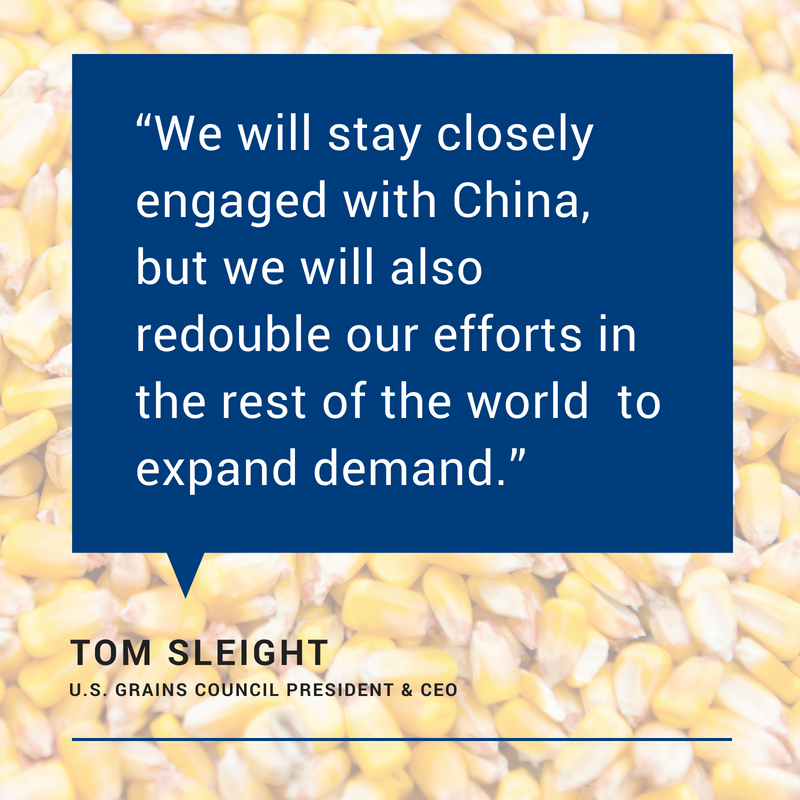An unstable market is a reminder of how important a global market development strategy is to long-term demand growth and weathering short-term trade disputes.
Despite dizzying headlines and potential trade disruptions caused by the threats of tariffs and retaliations between the United States and its trading partners, the U.S. Grains Council (USGC) remains unwavering in its commitment to enabling trade across the globe.
This week, the United States made good on planned new tariffs on Chinese goods, which should go into effect in the coming weeks; China issued new lists of products that would be retaliated against when that happens, including most major agricultural goods; and the United States proposed an additional 10 percent tariff on even more Chinese goods, worth about $200 billion.
Unfortunately, these challenges are not new for the Council or its members, who produce, sell and export U.S. corn, sorghum, barley, distiller’s dried grains with solubles (DDGS) and ethanol.
“The farmers and exporters we represent have been here before regarding China and they are well aware of what it’s like to deal with tariffs, counter-tariffs and policy restrictions,” said Tom Sleight, USGC president and chief executive officer in a statement. “Since 2010, we have been adversely impacted by trade policy actions by China against our products.
“China is a very important market for U.S. coarse grains and their co-products, but so too is the rest of the world. We will stay closely engaged with China, but we will also redouble our efforts in the rest of the world to expand demand.”
Partnering with members and utilizing funds from U.S. Department of Agriculture’s Foreign Agricultural Service’s (USDA’s FAS) Market Access Program (MAP) and Foreign Market Development (FMD) programs, which are authorized in the farm bill, the Council has worked to build global markets for U.S. coarse grains and co-products for almost 60 years.
With this experience comes the knowledge that when one market is disrupted, others can – and often do – absorb that tonnage. While these shifts often come with costly price and logistics disruptions, the diversification of markets is also a long-term gain for U.S. farmers and agribusinesses.
In both the short and long term, there is significant potential for demand growth in new and existing markets.
In less than a decade, Vietnam has jumped from the 16th to the third largest corn importer, facilitated by population and economic growth in combination with market development work by the Council. After it purchased four vessels of sorghum when China imposed 178.6 percent tariffs on the commodity, Saudi Arabia could represent another possible market to which to redirect grain sales. And Japan, South Korea and Taiwan all represent mature markets on which U.S. exporters have been able to rely to buoy shifting markets in times of trade turmoil.
All told, 75 countries buy U.S. coarse grains and co-products each year and will likely continue to do so as demand for protein and biofuels grows. The United States remains the most robust agricultural producer in the world and the Council will work to ensure the commodities U.S. farmers and agribusinesses produce reach those global markets.
“If the U.S. encounters trade issues in one market, we will turn our attention to redirecting trade flows,” Sleight said. “We are busy everywhere in the world creating demand for our products, so we trust the leaders at the USDA, the Office of the U.S. Trade Representative (USTR) and the White House know how critical open markets are to our industry and appreciate their support during this process and in this tense time.
“While they work out trade issues with China, the Council will focus our trade efforts elsewhere around the world to ensure there is little disruption for U.S. farmers.”
About The U.S. Grains Council
The U.S. Grains Council develops export markets for U.S. barley, corn, sorghum and related products including distiller’s dried grains with solubles (DDGS) and ethanol. With full-time presence in 28 locations, the Council operates programs in more than 50 countries and the European Union. The Council believes exports are vital to global economic development and to U.S. agriculture’s profitability. Detailed information about the Council and its programs is online at www.grains.org.

